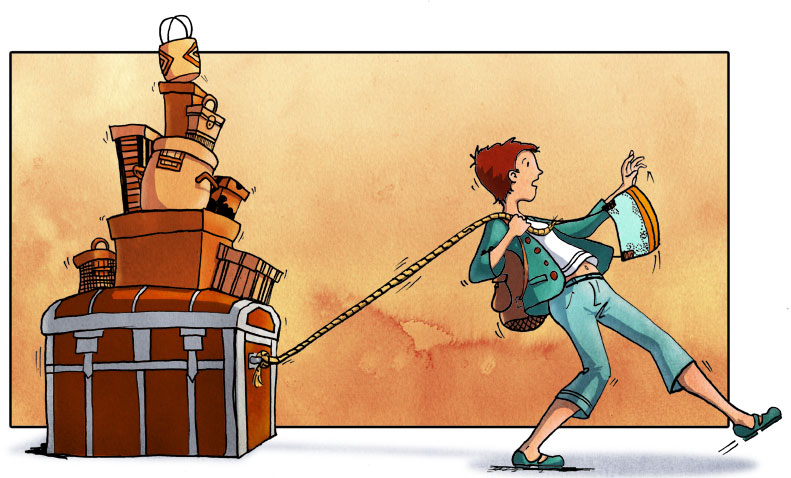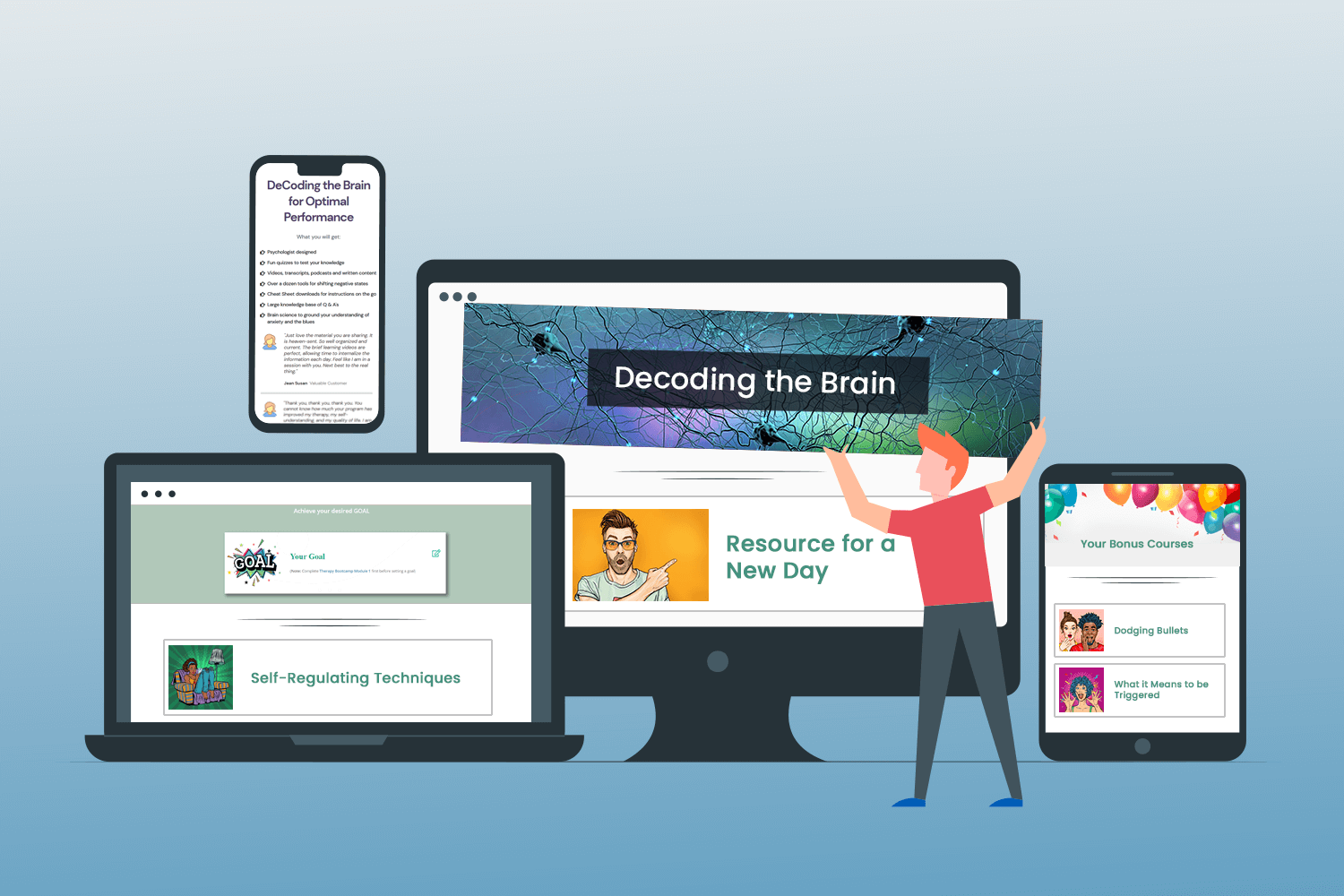Losing emotional control isn't pretty.
You'll laugh at the wrong time, say the wrong thing, cry at awkward moments, and lash out in anger with little regard for others.
The key for gaining emotional control is actually going in the opposite direction.
Why you lose emotional control
Simply put, you lose emotional control when your nervous system is full.
When the capacity of your nervous system is maxed out, its ability to modulate emotional triggers is gone. You've got no buffer zone.
This can happen quickly if a major life event has just maxed out your stress levels.
You see your nervous system gets "full" when the charge associated with number of triggers reaches a threshold and you no longer can "contain" the excess stimulation.
Many of you day's activities are stimulating. If your day included calming, restful activities, your nervous system could balance itself out and you'd automatically have more emotional control.
The problem for most people is that they can't take an hour out to de-stress.
The good news is that if you work on expanding your nervous system capacity, you'll have the best immunity from overwhelming triggers.
Note tho, it always pays to eventually deal with each trigger that robs you of your emotional equanimity.
Let me give you an example.
Chances are you've put some issues on the back burner for too long and now they're getting the better of you. You've got baggage.
The core of the problem though is that you can't tolerate the discomfort of moving through your emotions and consequentially, you've created a backlog.
Your nervous system has no more "room" to withstand the angst long enough to feel your way through.
The emotional content is in queue waiting to be released. Owing to your backlog, it catches you unawares.

Without that ability to ride out the emotional storm, life eventually becomes restricted in the range of all emotions - good and bad.
You're hard pressed to put words to your experience, and instead of emotions guiding your life, you’re looking for ways to stifle them.
Your world is narrowing - though you'll tell yourself it's just a choice you’re making.
Bottom line: when you improve your ability to tolerate emotions you 'expand' your nervous system . . .
Want more emotional control?
Here's a story that may have familiar aspects to you . . .
"You want to control your emotions?"
"It's definitely possible. It'll take some work."
That's essentially what I told Ellie when she told me how she lost it on her best friend Donna of over 40 years, yelling at her furiously.
She knew she should take the words back immediately but in that moment, Ellie felt compelled.
She knew she was behaving like the hyper critical parents she had left home to get away from.

One side of her brain told her that wasn't true and that she should immediately retract her statement. The other side couldn't shake the feeling Donna meant to hurt her.
Transference happens in all relationships
Ellie was having a transferential moment. She was experiencing Donna as if Donna was harshly judging her.
Donna's been a true friend for years.
Donna had merely asked "Why'd you decide to do it that way?"
They were talking about Ellie's decision to let her gardener go. He'd been cutting the grass and doing minor clean-ups since her kids were in grade school. As a single Mom she depended on him - one year he even shoveled out her driveway for free when they had a surprise snow fall.
For many months now he'd be inconsistent. The grass was one feet high this summer before he got around to cutting it. She had to cajole him into doing it at that.
Finally, she decided to let his contract go. It wasn't an easy decision and she was fraught with anxiety the day she had to tell him.
All the self talk she did up to that moment "it's okay, he'll find other work"; "you're just making a good business decision" didn't help at all when she approached him.
What Ellie wanted and what she anticipated others wanted was always a source of internal conflict for her. She'd wrangle over the decision for days trying to rationalize her decision until she couldn't take it anymore.
The reptilian lizard brain calls the shots
The reality is that you’ve got a nervous system that took millions of years to evolve.
Quite frankly, the odds are stacked against you if you think getting emotional control comes from thinking differently.
But if you’re still serious, you’ll need to upgrade your “hardware”. That "hardware" has to do with how well your nervous system self-regulates.
In other words, I'm speaking about how well your nervous system regulates the amount of incoming stimulation (ie. challenges, excitement, stress etc.) within a tolerable window and then subsequently let's go so you don't get backed up feeling wired or pent up.
Emotional control is not about repressing emotions
Now having arrived at this page, all that you might be thinking is in terms of "Man, I gotta have more control. I'm losing it here".
Maybe you’re still cringing with embarrassment recalling that outburst during the last corporate gathering . . .
“Did I really accuse my cubicle mate, “you had an unfair advantage”. Talk about sour grapes. I can’t believe I said it.”
Or,
"I can't get it out of my head and I'm going in circles. I'm making a mountain out of a molehill - just thinking about nonsense."
Don't get me wrong I'm not talking about repressing emotions. In fact, quite the opposite.
With true ‘emotional control’ you experience your emotions within a range that’s tolerable. Instead of overreacting, you have the capacity to hold the feeling within you while you decide what to do.
Emotions guide your reactions, instead of taking you down a path you wished you hadn’t gone.
Consider the kids in the famous Stanford Marshmallow Experiment (see a video from that test below); those children who could “contain” the impulse to grab the marshmallow win the prize (ie.they’d get two marshmallows if they waited). It turns out the winners’ self-restraint was related to a higher capacity in the pre-frontal cortex.
I’d bet dollars to donuts the winners had more neuropathic connections from the pre-frontal cortex connected to the primitive areas of the brain. And if this is true, then the brain’s ‘plasticity’ makes it possible to increase emotional control by working on those connections.
(The irony is is that once you achieve emotional dexterity and spontaneity, you stop thinking of 'control' and just get on with your life. It doesn't even cross your radar. It's no longer an issue.)
Your emotions will hold you back or move your forward
Taking things too personally? Worried about “losing it” yet again?
I don't think I'm telling you anything new when I say, how well you control your emotions will impact your life in every aspect: your career, you business, your relationships, your health - even your spiritual state.
In fact, it’s estimated that for every rung on the emotional awareness scale it increases your financial asset by $1300.
When the crazy making starts happening

When we're backed up emotionally, we can get caught unawares.
I haven’t told you the worst of it.
There’s a gazillion ways your brain sends you in the wrong direction, but the worst is when the crazy-making starts. It happens when the nervous system is “full” - it has maxed out its capacity to function and compromises have to be made. Your ability to think and perceive normally gets severely curtailed.
This is when you’re going “half-cocked”. You’re spinning out of control and people look at you as if you’re crazy.
When your partner says “I love you”, you suspect it’s a ploy to get something from you.
Or a family member hasn’t said a word, but you know what they’re thinking and now you’re enraged.
What’s worse is you can’t understand why you're acting this way, what's making you fly off the handle.
It's not only negative emotions where the brain contorts how you experience others.
Maybe you can’t shake the feeling that you and your therapist would make a fine couple. You’ve heard of transference but “this can’t be it - I know how I feel, right?”
Everyone has a different reality
The fact is that every single one of us experiences reality from our own filters. It’s not just how we see things differently. Yes there’s that. But it’s bigger than that.
Whatever your mind has manufactured for you in order to comprehend a situation, you feel it right down to the very cells in your body. You sincerely feel that this really is the case.
It's more than simply imagining a possibility intellectually. You're experiencing that one possibility, and only that possibility, as if it were real. It feels perfectly right.
Most people believe they can fix this fixation with “software”updates“ ie. "Change my thinking and I’ll be okay.”
This approach can work quite well for small behavioral changes but it's basically useless for modifying the brain's "hardware".
You see, the degree to which your nervous system ("hardware") is “full” is the degree to which your mind is not your own.
You’re much more under the control of your primitive hardwiring - otherwise known as the reptilian brain - than you realize.
Can people really change?
Human beings make changes all the time, especially small behavioural changes. Drink more water, eat less, start a fitness program. If you can sustain it over 30 days straight you apparently have a better chance of sticking to it.
But greater emotional control requires something fundamentally different . . .a deep internal change. After all, this change will have to adapt to numerous situations, most of which cannot be predicted.
It’s not as simple as the typical "just do it" coaching mantra, you know the kind: "eat better, sleep better, do a marathon on the weekend".
Nor is it just "choosing" differently. After all, if you really had the choice you wouldn’t be sitting there reading about how to control yourself, now would you?
There’s no easy sound bites to describe a Ground Hog Day makeover. In fact, the fundamental change I’m referring to can only been achieved by putting in the necessary time and practice.
From my own personal experience and what I’ve seen with a number of clients you wake up each day and feel like you’re in a different body.
You're not as reactive as you used to be, and your usual demeanor is decidedly more chilled out. The ‘relaxation response’ is now your go-to default state.
You have lots of "room" in your nervous system to handle whatever the day brings.
So yes, you’re still Marissa, and will always be Marissa. But your life has taken a decidedly different trajectory.
You now have options, and genuine choice.
What you've gained could be described as an 'entrepreneurial mindset' (whether you’re working for yourself or others). Because when you have emotional control, taking on new challenges is easier.
You've acquired a sense of agency about your life.
Here's the interesting factoid about emotional control. Once you feel "settled" inside, connected to your inner core and you're regularly "emptying your bucket" you stop thinking about emotional control. It's no longer an issue for you.
Can you ever achieve perfect emotional control?
Probably not. And who would want it anyway.
Yeah, we’re all going to lose it one way or another. It’s just that some of us do so on an almost regular basis. That’s the problem.
What can self regulation of the nervous system offer us?
There’s numerous ways we can eliminate your triggers. By far the easiest, is through a healthy self-regulating nervous system. A healthy nervous system can tolerate being triggered without losing emotional control. So rather than focus on dealing with each trigger, begin by improving your nervous system health.
With an expanded nervous system you can hold the charge of a trigger and still maintain your cool.
Before I move on, I want to quickly put a few out-dated strategies in perspective . . .
“Insight” is highly over-rated
The self-help industry is booming. We’re very good at understanding ourselves.
But translating insight into feeling different on the inside isn't as simple.
You'll often hear therapy clients say “I know my patterns now, but how do I change them?”
And who hasn’t heard: “If I told him once, I told him a million times.” He may know what he’s doing but making that change is another matter.
The rate at which people actually implement the strategies they read about like from an online program - is less than 5%. That’s appalling.
People do change but usually it’s exceedingly slow - the lesson is painstakingly learned over and over again until the discomfort of your old pattern heavily outweighs the birthing pains of the new one facing you.
Sometimes - especially if your options are limited - a major event radically shifts you into a new state of being.
It's usually unpleasant, and typically you don’t embrace the experience.
(Like the latest company initiative where it’s ‘out the door’ or face the consequences).
Or your partner decides to leave you.
Isn’t it amazing how suddenly everything comes into perspective and your priorities re-organize themselves.
Because the brain is in a critical state of readiness for change.
It will very quickly acquire new learning if conditions are right and there’s a chance of less pain.
The biggest mistake you can make
Most people try to solve their emotional problems with their "left thinking brain".
They like to analyze the problem, try to"figure it out", hoping to uncover the angle that will set them free. Sometimes it’s like fighting your way out of a paper bag.
Like deciding to up your freelance pricing. You know it’s a good idea. You’ve assessed the competition. You’ve gotten good feedback on your work. But you can’t help thinking you’ll be scaring people off. That pit in the middle of you stomach must be saying something. Maybe it means you’ll be destitute.
Are you sizing up the marketplace accurately? Or is it that your fears are hijacking your thoughts?
Maybe you re-interpret the situation and try to see the other side.
But it doesn't stop you from having that same gut-wrenching reaction the next time.
You can try to change your “software” this way, but it won’t stick.
Neither does this work
The next piece of advice: count to 10 before you blast them with your anger.
Sure it works - if you’re not that angry.
How about trying to"reframe the situation”?
“Oh, I was just tired and got triggered. Said things I didn’t mean. I won’t do that again.”
“Beeeeeeep”
Sorry. You will do that again.
And surprise. You will find yet another reason to excuse your reaction.
You’ll find another reason because that’s just how the brain works.
It’s just that you’re dealing with something that’s a little outside the reach of your everyday smarts.
So let’s don’t get into “self bashing" - I’m sure you’ve done enough of that already.
(Btw, don't think that becoming really "smart" (like getting a doctorate 🙂 means you'll escape these problems. Been there done that.
In fact, if you're really "smart" and reading this, you're likely going to be the last person to embrace what I'm telling you.
Because guess what? These left brain strategies do work . . . sometimes.
Like the lab rat that continues to press the bar even tho food comes intermittently, you’re being reinforced with the strongest possible incentive.
And therein lies the problem. You get hooked in this way of solving emotional problems. Naturally enough.
By now you might have guessed that the “software” updates come in the form of “change your thoughts so you can change how you feel”.
The problem I have with this advice is that it sounds so darn sensible.
But it's a top down left-brain approach.
It comes from the latest stage in our evolutionary development - what’s known as our Neo-cortex.
It’s the top-of-the-line thinking machine. (The curly grey matter that sits above the primitive reptilian parts.)
But in reality “thinking” is almost always the last stage in the change process. That’s when it feels like a no-brainer to make the kind of change you want.
That sudden intellectual awareness was pre-empted by an ancient brain that saw the writing on the wall days, hours, even milliseconds before.
You can go on thinking “oh, I just decided this would be better”.
Misattribution is probably the commonest way the brain confabulates.
(Some say our Neo-cortex has a superiority complex, and if you understand the basic wiring in the brain - they’re absolutely right.)
Use a bottom-up right-brain approach instead
The problem is you’re trying to solve a right brain problem with left brain tools.
Note that behavioral change lasts for only as long as you have sufficient will power to maintain it. (By the way, the amount of will power you possess is totally dependent on . . . you guessed it . . . your 'hardware'.)
It's works as long as you have sufficient "room" to tolerate the discomfort so you can just push through and deal with it.
However once you add in a little stress here and there, maybe a small challenge at work, or a relationship hiccup, and suddenly that extra “room” disappears and you're back to your old ways.
And we’re just talking about how to deal with it whenever it pops up - that’s called ‘symptom reduction’.
Getting rid of it at it’s source is the real solution to the problem.
Not to mention that a that top down approach will take ages.
How to keep emotional control, no matter what issue is triggering you
It’s easier, and you get results faster, when you work on your nervous system before you resort to left brain techniques.
For one, once your nervous system is working better (ie.'regulated') you’re less prone to being triggered.
You see, anything that triggers you sets off an arousal pattern of neural firing in the brain that's automatically reflected in the body.
If your nervous system can “hold” that arousal pattern without reaching its maximum capacity, then you're able to stop, think and then choose your next step.
You can gain and maintain emotional control a lot faster and for a lot longer by working on your nervous system this way.
After all, you might have quite a few triggers - however the nervous system is one entity. (That's the beauty of it. One thing to focus on that solves a whole host of problems.)
You have two options for greater emotional control
You have a choice: address the underlying emotional issues (that are often based on your early attachment history) , or improve your background 'hardware' (your nervous system) directly.
No matter how deeply rooted the issue may be, if your nervous system is 'big enough' the discomfort you feel will be contained, and you'll be able to maintain emotional control.
Eventually you’ll want to deal with that emotional issue, but in the meantime at least you’re in control, not swept away.
There's a good ending here
Emotional freedom is achievable. Using simple rules from neuroscience, you can expand your nervous system capacity and subsequently work through your triggers.
It's not even necessary to work through all your triggers. A good feeling state can be achieved with small steps.
MYSHRINK'S OWN
'ELIMINATE TRIGGERS WITH DECODING THE BRAIN'
CLICK BELOW TO LEARN MORE


